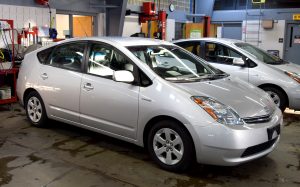Former Student Donates Hybrid Vehicle
A former Northern Maine Community College student and his wife are helping Automotive Technology students get a leg up in the ever-evolving world of electric and hybrid vehicles.
David and Mary Ellen Boone donated a 2007 Toyota Prius to the program.
“This donation will help our students get the hand’s-on experience and training they need in order to be successful after they complete their Associate in Applied Science Degree or their certificate,” said Pamela Buck, Trade and Technology Department Chair. “We greatly appreciate David and Mary Ellen Boone’s generosity.”
“The NMCC Transportation Trades are very grateful for a generous donation from a former student who believes in giving back by donating a Toyota Prius,” added Paul LaJoie, Automotive/Transportation Trades Instructor.
The donation will be part of the Automotive Technology curriculum and specifically used in the Alternative Propulsion Systems course, which is an advanced level course to enhance students’ knowledge and troubleshooting skills in hybrid (HEV), electric (EV), fuel cell, and other vehicle propulsion technologies.

The generous donation of a 2007 Toyota Prius by David and Mary Ellen Boone will help Automotive Technology students at Northern Maine Community College have the advantage of working with green technology.
“Students will learn and understand the various systems, power electronics, electric drivetrain, high voltage batteries and hybrid/electric vehicle high voltage safety,” said LaJoie.
American sales of hybrid electric vehicles represent about 36% of the more than 11 million hybrids sold worldwide through April 2016. Since their inception in 1999, a total of 4,058,258 hybrid electric automobiles and sport utility vehicles have been sold in the country through May 2016, according to data collected by hybridcars.com.
The NMCC Automotive Technology program is designed to provide broad fundamental training in all aspects of automotive service and repair, using up-to-date materials and technology. Training moves from basic repair knowledge to a concentration on automotive electricity, including batteries, starting systems, charging systems, ignition systems and vehicle wiring during the first year. In the second year, students gain knowledge and experience in areas such as engine performance diagnostics and repair, automatic/manual transmissions, final drive assemblies and hybrid technology.




